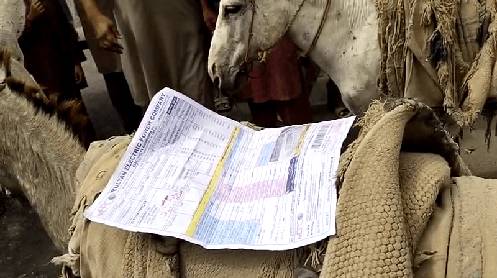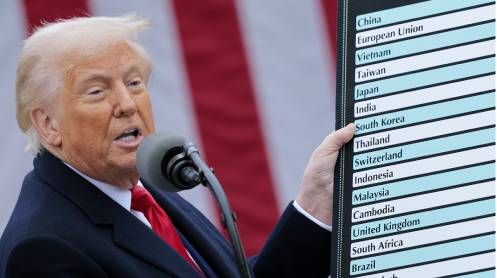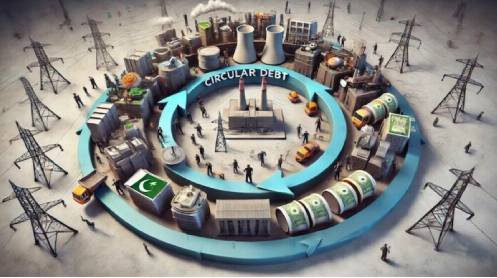People in different parts of the country on Saturday expressed despair and anger at unprecedentedly high electricity bills with some threatening demonstrations and even a civil disobedience campaign if the extra taxes weren’t deducted.
The severe reaction led caretaker Prime Minister Anwaarul Haq Kakar to call an emergency meeting at the Prime Minister’s House tomorrow (Sunday).
“In the meeting, a briefing will be taken from the ministry of power and distribution companies and consultations will be held regarding giving maximum relief to consumers regarding electricity bills,” the premier said on X (formerly Twitter) today.
On Friday, people from all walks of life took to the streets in Karachi, Gujranwala, Peshawar, Toba Tek Singh and other areas against exorbitant power bills. They blocked roads, set fire to power bills and announced they would challenge the “injustice” by the public utility in the court of law.
Speaking to Energyupdate, one person deemed the taxes imposed by the government as “sheer cruelty”, adding that he would be old by the time he paid off his entire electricity bill.
“The bills are so high that we are unable to pay the school fees of children,” he said. “If a person is living in a rented house, he has to decide either to pay the rent or the electricity bills.”
Rawalpindi
In Rawalpindi, a large number of people protested at Rawalpindi’s Liaquat Bagh against the high electricity bills. They held banners and placards while chanting slogans against the local electricity provider.
“Our bill has doubled. I don’t have my bill in hand right now but this time our bill was Rs84,000. When I sent my son to get it fixed, they adjusted the bill to Rs54,000. If you are increasing this bill because the IMF asked you to do so, it is still wrong,” one protester said.
“There is no notification from the government and these Wapda and all [electricity suppliers] are increasing it at their own whim,” he added.
Another angry protester said: “Our next move will be a strike throughout the country from Karachi to Peshawar by the traders community.”
He added some protesters told him that if the taxes weren’t taken back, they would move towards Islamabad and start a civil disobedience campaign.
Islamabad
A visibly annoyed resident of the capital city told DawnNewsTV that he was in no position to say anything and the government’s increase in electricity taxes had rendered him “speechless”.
“Last month my bill was Rs38,000 and after many hardships I paid it. Now it is Rs48,000. We can neither live nor die. The government has snatched all our happiness away from us,” he said.
Peshawar
A cobbler identifying himself as Hameedullah said his daily earning was Rs600 but he was charged with a bill of Rs16,424. “We have three lights, four bulbs, and one fridge in the house,” he said. Pointing to his inventory, he added: “This is [worth] Rs6,000. I don’t have any more money.”
Lahore
An exasperated rickshaw driver lashed out at the government saying: “First my bill used to be Rs2000-Rs2500 and now it is Rs10,300. Where should we go to clear this?
“I don’t even earn this much. How should I pay for this? My daily wage is Rs1,000-1,200 out of which we pay Rs500 for petrol. Running a stove at home costs between Rs500-Rs600. Where should we go? This inflation has destroyed us. We just have one energy saver at home that runs throughout the day and night.”
Karachi
A shopkeeper in Karimabad Market explained that the main problem was that there wasn’t much business these days. He added that there were new bills every day. “Should we pay the bills or buy groceries for home? Our children are also very worried.”
He said he was left with no choice but to protest.
On Thursday, reports of traders allegedly attacking K-Electric employees at a market in Karachi emerged. KE CEO Moonis Alvi later confirmed the same on X (formerly Twitter) and demanded that a first information report be registered against the attackers.
Quetta
A daily wage labourer at Meezan Chowk told DawnNewsTV that these days work opportunities were “really few” as cement and steel had become expensive. He also posed the same question that others asked: whether he should pay his bill or fulfil the need for groceries at home.
“Please for the sake of God, control the inflation. I’m very worried,” the daily wage earner bemoaned.
Multan
The protests in Multan were emotionally charged. Protesters tied their electricity bills to donkeys as they marched towards the Gujranwala Electric Power Company (Gepco) while chanting slogans against the government.
Dawn.com staffers also raised similar concerns. One staffer said his bill amounted to Rs12,000 this month. He urged the government to think differently and find a way to despite the current IMF agreement as consumers can’t pay extra taxes on bills amidst exorbitant prices of necessities.
K-Electric responds
In an audio message broadcast on television, KE spokesperson Awais Rasheed Munshi could be heard saying: “We understand that many conversations and arguments are taking place between people throughout the country regarding the rising electricity prices.
“People might be getting angry while being worried. Pakistan’s electricity system works in a regulated environment. This falls under NEPRA and power ministry. K-Electric’s work is related to performance, profit, and loss.
“When the prices of electricity rise, the company doesn’t make any profit. K-Electric and no other distribution company have any part to play in the rising prices and taxes,” he said.
Situation
The rising electricity costs appeared to have put the power companies in a vicious cycle of declining consumption and shifting resultant additional capacity charges to consumers, compelling the government to seek the staggered imposition of Rs146 billion quarterly charges in six months, instead of three months to minimise the ‘price shock’.
The situation emerged at a public hearing organised by the National Electric Power Regulatory Authority (Nepra) on the government request for Rs5.40 per unit additional quarterly tariff adjustment (QTA) to consumers for April-June 2023 when the Power Division made a departure from its petitions. It requested that consumers be charged at a rate of Rs3.55 per unit for six months, instead of Rs5.40 per unit for three months, to reduce the price shock on consumers still struggling to absorb 26pc increase in base national rates notified last month.
Also, the Power Division proposed that even the Rs3.55 per unit additional charge should be imposed after September when an existing quarterly adjustment of Rs1.24 per unit would lapse, thereby further reducing the cost increase. The net increase in tariff for six months — October 2023 to March 2024 — would thus stand at Rs2.31 per unit, a Power Division official pleaded before the regulator.





